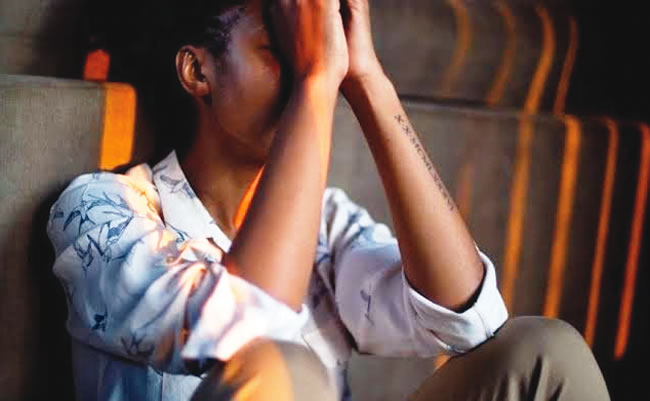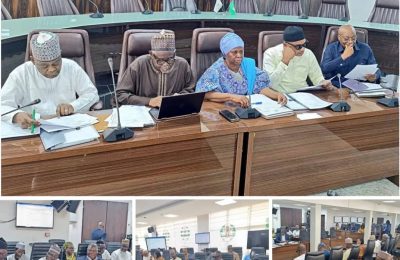
Individuals predisposed to mental health disorders in poor socioeconomic situations stand a higher risk of succumbing faster to mental health changes like depression and anxiety. In this report, SADE OGUNTOLA spoke with experts on the many socioeconomic issues that predispose many Nigerians to succumb to mental health issues.
NIGERIA’S infrastructure and social services are in appalling condition. While the country is experiencing more inflation, the unemployment rate is rising, pushing many youths down the precipice of hopelessness. In recent times, the naira has depreciated to over N1,600 to $1, and the level of inflation has deeply affected the daily lives of many Nigerians, particularly in terms of buying power and the cost of living.

Economic inequalities in Nigeria are becoming a major determinant of mental health, with poverty, poor living conditions, limited access to healthcare and education, workplace stress, social exclusion, and historical trauma contributing to higher rates of depression and anxiety among many Nigerians regardless of their social status.
The intersection of financial strain and mental health has become increasingly evident, prompting questions about the extent to which the current cost-of-living crisis is contributing to a surge in poor mental health, including anxiety, depression, and suicidal ideation in the country.
Giving an insight into the issue, President of the Association of Psychiatrists of Nigeria, Professor Taiwo Obindo, agreed that lack of food to eat, insecurity, and the increasing number of unemployed and underemployed people had left many Nigerians frustrated, a development that later leads to depression.
“The pressure on Nigerians is rather great, and many of them are struggling to cope. The economic situation is actually very difficult. Those who are coping are those who had resilience; those who, over time, have developed some form of coping mechanism,” he added.

Prof Obindo declared that individuals with a genetic predisposition for mental health disorders in poor socioeconomic situations stand a higher risk of succumbing faster to mental health changes like depression and anxiety.
Obindo stated that it shouldn’t take any serious thinking to look around and see how frustrated and disappointed a lot of Nigerians are, particularly with the economic situation in the country.
He stated, “While I don’t have the number, there has been increased awareness about mental health conditions, but seeking help and raising awareness alone cannot account for the things (number of mental health cases) we see.”
Speaking in the same vein, Professor Taiwo Sheikh, a psychiatrist at the Department of Psychiatry of the Faculty of Medicine at Ahmadu Bello University, Zaria, said that the economic crisis is a social determinant of suicide.

Social determinants of suicide include everything that challenges an individual’s psychological patterns, mental health patterns, position in the house, ability to pay school fees, ability to afford mental health care, and so on.
“A lot of people struggle to provide for their families and themselves on a daily basis in Nigeria today. There are unfulfilled dreams of young people, adults, and families. And these are the things that are driving people to the brink,” he declared.
Prof Sheikh declared that anything that increases the rate of mental health conditions in Nigeria will increase suicide.
“Anything that drives up the rate of depression in Nigeria will increase suicide. Suicide rates in Nigeria will also rise in tandem with any increase in substance addiction.
“Ninety percent of suicide deaths are related to mental health issues or substance misuse. Additionally, 30% of the 90% of people who died by suicide had depression,” Prof Sheikh said.
Sadly, depression affects a lot of people, although it often goes undiagnosed because of other issues. Some turn to alcoholism, heavy drug use, or withdrawing and losing interest in their surroundings.
Also speaking on the issue, a psychiatrist at the Ladoke Akintola University of Technology (LAUTECH), Ogbomoso, Dr Adeoye Oyewole, however, said that depression is not the same as sadness or a feeling of struggling along in life.
Explaining further, he said it is possible to be depressed without being sad, adding that despite the fact that feeling low or sad is one of the requirements for depression, it is possible to be sad without also being depressed.
He, however, clarified that any form of sadness that incapacitates and affects the person’s functioning in terms of relationships, both at home and at work, is a mental illness.
“But by the time sadness takes over a person’s soul, he is downcast, lacks the energy to do anything, and probably starts to cry for no reason; it is already a mental problem. It is in excess. Initially, it is assumed that it will stop, but it is not,” he explained.
According to him, there are times when sad people don’t want to get out of bed in the morning or perform other simple daily tasks like brushing their teeth and changing their clothes. They also lose the will to live, feel unworthy, and lose interest in enjoyable activities as a result of excessive despondency.
Dr Adeoye claimed that although depression is quite common in old age, it is frequently hidden.
“Some retirees will admit to you that their sleep quality is poor. Many of them are full of resentment; others lament past choices or missed opportunities. They are hence depressed.
“In African culture, men are not allowed to display vulnerability. Men shouldn’t cry, so they try to mask it. But excessive crying is one of the signs of depression.
“To mask it, some get sarcastic, withdraw, become unduly irritated, and medicate with alcohol and drugs. Depression is the underlying factor for most of the drug abuse cases, particularly among younger generations in Nigeria.”
Dr Adeoye added, “Depression is almost in every other family, but it is masked. With these current socio-economic challenges, we are expecting a larger number of people to break down.
“Experiencing depression is one way that is showing that one is not coping. It’s different from other forms of illness like psychosis in that the person may not be talking excessively and disturbing people. You simply stop talking.
“A good number of people you see on our prayer mountains clearly are depressed. A portion of them will meet the requirements for depression, if they are assessed.”
Strangely, feeling sad is more common among younger generations as a sign of the current socioeconomic problems.
In his contribution, another psychiatrist at LAUTECH, Ogbomoso, Dr Taiwo Alatishe, said the people who make up the younger generation are less resilient in this economic crisis, unlike the older generation, because their psyche is developed such that they are used to getting everything they want.
“They are less resilient; they can’t cope with stress. And some of them turn to substance misuse as a coping mechanism for their sadness or other problems. Depression is not brought on by the state of the economy. Rather, their vulnerabilities are being exposed by the current economic climate. Someone who is resilient will not reach that stage of depression because they will still find a way to cope, whether it is through hope, faith, or prayer.
Dr Alatishe said such young people might have low self-esteem, mood swings and lose interest in activities around them, and find it difficult to concentrate in class because they are often lost in thoughts, thus affecting their assimilation and their academic performance in school.
In the worst-case scenario, the medical expert added that depression makes them hopeless, tired of the world, ideate suicidal thoughts, want to harm or kill themselves.
Moreover, “some of them also develop multiple physical symptoms, like persistent headaches, body pain, the feeling of something crawling in the head, stomach ulcers, and other more awful complaints. They treat it, and it keeps reoccurring.”
Regardless of the current socio-economic challenges pushing a lot more people to have mental health conditions like depression and anxiety, access to treatment remains limited. This, Prof Sheikh said, had also increased cases of suicide in Nigeria.
“And more people are breaking down and fewer people are getting treated. And that also increases suicide. Over 85% of people who previously had a mental health condition do not have access to treatment in Nigeria.
“Access to treatment is provided, but the government does not support the cost of treating mental health issues. But individuals lack the resources to take care of themselves. They are even unable to afford their transportation to get to these treatment centres.”
According to Prof Sheikh, social issues that are beginning to rise in frequency and incidence of mental health disorders are also contributing to an increase in suicide in Nigeria and need to be addressed immediately.
“We need to subsidise education for young people. We need to prevent abuse among young people. We need to create employment opportunities for people. These are addressing the social determinants of mental health and social determinants of suicide.”
To address the issue, he said that Nigeria must decriminalise suicide, allowing those experiencing suicidal thoughts to come forward and seek assistance. Additionally, the Federal Ministry of Health must put the National Mental Health Act into effect, providing a clear framework for the country’s mental health care system.
According to him, the Federal Ministry of Health’s suicide prevention plan framework, which was introduced last year, needs to be implemented as part of Nigeria’s societal approach to mental health care and suicide prevention.
Prof Sheikh called for the revocation of the law that criminalised suicide in Nigeria and stipulated that anybody who attempts suicide and voices it out will go to jail for one year.
“People are not speaking up. They converse with themselves. They have no other way to communicate. And they pass away silently. Therefore, that law must be repealed,” he stated.
Regardless of this, Prof Obindo declared that there are mental health facilities spread out around the nation where those who are experiencing anxiety, depression, or other mental health issues can get the assistance they need.
He said that not all cases of mental illness, such as depression, would call for the usage of medicines.
“The person should see a mental health professional first, even if medication is not warranted; the earlier the presentation, the better the treatment outcome.
“People frequently don’t have the best results if they don’t seek treatment from a mental health professional in the early stages of their illness,” he said.
Prof Obindo decried the prohibitive cost of medications for mental illnesses, saying this has contributed to an increase in the number of people suffering unnecessarily from the complications of these illnesses.
“A patient of mine used to be able to get his monthly medication at N6,000, but the medication now costs over N20,000. A lot of them don’t even have jobs because mental illnesses have also been linked with decreasing functioning, especially if appropriate intervention was not received early on.
“As a result, many of our patients who have been receiving medication are unable to pay for their prescriptions, which lead to relapses in the mental health condition.
Prof Obindo argued that the government should make sure that out-of-pocket expenses for mental health problems are kept to a minimum.
He recalled that medical treatment for people with mental health conditions was free when he first started his training to become a psychiatrist.
He claimed that requiring patients to pay out-of-pocket for mental health issues is affecting how many Nigerians, including those who have these disorders, seek medical attention.
“Those who don’t have enough money to eat –not to mention those who are currently taking medication and must pay for it out of pocket– are within this group,” he declared.
He made a case for the government to improve universal health coverage so that people can access help as soon as possible when they have symptoms of mental health problems without having to think about how much they will pay.
He called for the inclusion of more recent medications and therapies for mental health issues in the national health insurance programme’s coverage.
To ensure that Nigerians have access to this specialised care, he said, more funding must be allocated to health, especially mental health, as part of efforts to stop the flight of psychiatrists.
“Three times as many trained mental health practitioners as we have within the country are outside of it. They are in the US and the UK, and the number of professionals departing is rising. More mental health professionals will be working in the nation and providing assistance to people with mental health issues if we can figure out a means to stop the amount of people leaving,” he added.
READ ALSO: Tithe: ‘It takes humility to apologise’, Mike Bamiloye defends Adeboye








